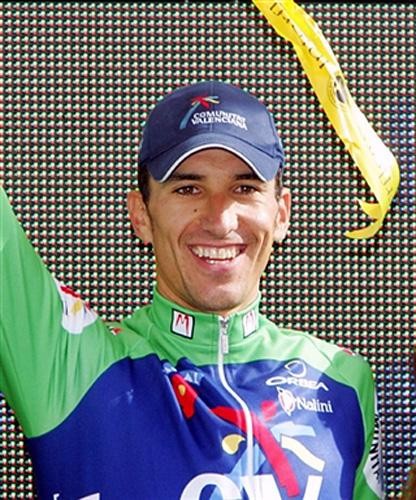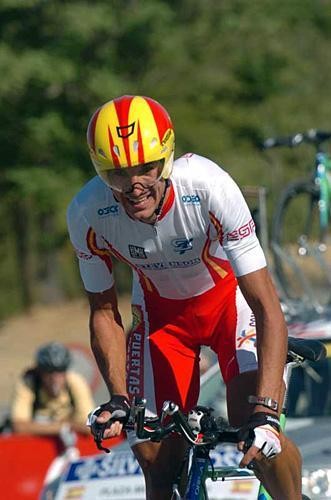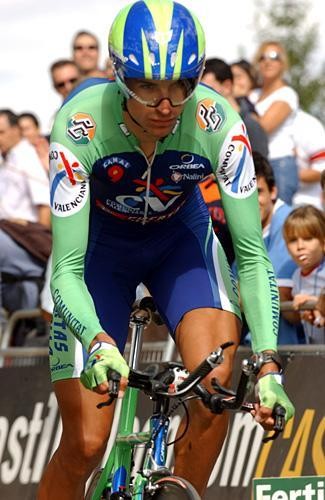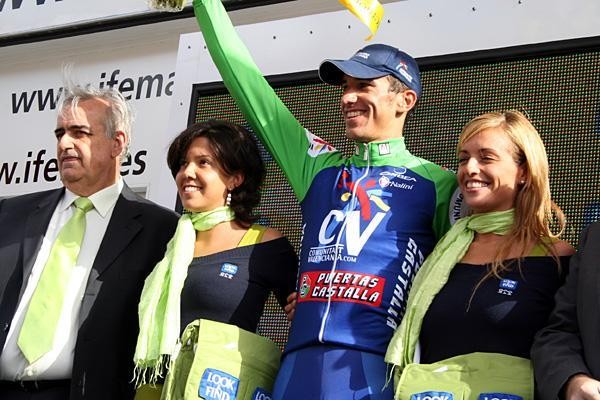Chasing Rogers' wheel
Ruben Plaza is a rider with a bright present and an even brighter future, believing that not before...




An interview with Ruben Plaza, December 22, 2005
Ruben Plaza is a rider with a bright present and an even brighter future, believing that not before too long, he can win the world time trial championships. And as Cyclingnews' HERNAN ALVAREZ found out, the 25-year-old from Alicante also believes Roberto Heras to be innocent and the ProTour to be totally unfair.
The latest performances from Ruben Plaza at this year's Vuelta a España and world championships demonstrate he is beginning to distinguish himself. On the penultimate day of the Vuelta, the Spaniard won a spectacularly fast time trial from Guadalajara to Alcala de Henares, the birthplace of Miguel de Cervantes, author of Don Quixote.
Days later, he finished fourth in the world championship time trial in Madrid. Michael Rogers won his third successive title and the performances of José Ivan Gutierrez Palacios and Fabian Cancellara left him just a step away from the podium. However, Plaza believes before the next world's, he can turn the tables on the Australian.
Cyclingnews: How was the season for you?
Ruben Plaza: Very good for me because I had two performance peaks programmed; where I achieved the goals I had thought possible. At the beginning of the year, my goal was to win a one-week race [Vuelta a Aragon] and the second performance peak was the Vuelta, where I won one time trial and I was also able to finish the race [Plaza finished sixth overall - ed.]. So, the year was perfect for me.
CN: Maybe the sweetest moment of the year was in Alcala de Henares, right?
Get The Leadout Newsletter
The latest race content, interviews, features, reviews and expert buying guides, direct to your inbox!
RP: In general, it was the whole Vuelta. It highlights more what I did in Alcala because it was [more than] a stage win; I saw myself fighting in the uphill finishes. I saw myself very close to the leaders and I liked it. I saw myself fighting with the climbers in the mountains in order not to lose much time to them.
CN: I was there when you won in Alcala. What do you think about what happened to Roberto Heras that day?
RP: That very day I thought that he had done a fantastic time trial, but it was because of the condition he had and that he had a good day. I thought and I still think the same thing today, despite what happened later.
CN: Do you think he is innocent in this doping affair?
RP: I think he is innocent. The person responsible for this positive case wasn't him, at least not 100 percent. Maybe he was to blame, but he is not the only one responsible. And this is considering that the doping control was right; I also doubted that the methodology was good, and even if it was, I doubted that Roberto was the only [person] responsible.
CN: That day both of you did a tremendous stage...
RP: It was the last chance for me to win a stage in my specialty, time trials. I think he did a spectacular time trial. I think his performance was because of how he was and also [Carlos] Sastre and [Francisco] Mancebo did a very good TT. I think his good time trial was because of his good condition that he showed throughout the whole Vuelta.
CN: Let's talk about the TT in this year's world championships. You were assigned for a top three finish before Michael Rogers finished. When he ended and you dropped to the fourth place, we, the journalists, saw you really didn't want to get out of that gate, you refused to leave that area. It seemed to be symbolic that you refused to step out of the podium, right?
RP: Yes, to be there in the podium and then to be left aside, it's hard. I knew that was going to happen because of the reference we had. In the end, time trials don't have much mystery. The fastest is the one who wins, and in this case, it's not nice to be there, savoring the podium and at the last minute to be dropped out of it. But I'm used to that because it happens very often.
CN: Three months have passed since the world's. Do you give value to that fourth place?
RP: Yes, I give value to a fourth place in a world's. The point is that for me it is the second fourth place at a world championships because I was fourth as a youngster in the individual pursuit. Maybe it's the worst place in a world's because you're so close to the medals. It's the place with the worst feeling, but I guess it's better than fifth.
Besides, analyzing how the time trial world's race was, the ones who were ahead me [Rogers, Jose Ivan Gutierrez and Fabian Cancellara] were riders who prepared for the race exclusively, who competed in the Vuelta some days or who weren't even at the Vuelta. They were preparing the race for a long time, which I couldn't do because I was riding the Vuelta. Then, considering that, I should be satisfied.
Denis Menchov, for example, he was competing in the Vuelta and you can see the time he lost. It's clear that being at home is the best option to prepare for the world's.
CN: How did you see Jose Ivan Gutierrez that day?
RP: He was second, but I didn't see him very happy that day. Certainly he started with winning ambitions and he saw Rogers was better and that didn't please Gutierrez. If I had been second, I would have been very happy for coming runner-up. He [Gutierrez] didn't take it like that. He also declared he had been world champion and that he wanted to become world champion again. While it was a defeat for him, for others it could have been a joy.
CN: Do you consider yourself capable of beating Michael Rogers in Salzburg 2006?
RP: I'm not so far from him [in performance terms]. I think that if I prepare for that race consciously I could do better; I could be close to him, but it's impossible to beat him by two minutes. It's not easy to say I could beat him, but I think I could be closer to him or even beat him. If I prepare for the race as he did in the last years, certainly I would be closer to him.
CN: What do you think about this big split between the Grand Tour organizations and the UCI?
RP: I think it's positive for cycling that the big races, the stronger races want to open the closed gate they [the UCI] made with the UCI ProTour. I think it's good for cycling because I think the system benefits the ones who are inside of it. I think that something like the ProTour is totally unfair.
It's very good for our team and for cycling in general that someone has given a punch to the table and said "stop". I think they [the UCI authorities] wanted cycling to change for better, and I think they didn't achieve that. What they got is a change, but for worse. I congratulate them [the Grand Tours' organizers] for the decision they have taken, for sure.
CN: How was that victory in the Vuelta a Aragon?
RP: Sometimes they say victories don't come when one wants them. In the Criterium International I was in better shape and I thought I could finish further in front. I arrived at Aragon with my condition low but then I did a good uphill time trial and I was able to win the tour. One doesn't always win when he wants to, but when the circumstances are favorable to achieve victory.
CN: How do you see the Vuelta a España 2006 parcours?
RP: There are mountains in the route, but they are separated a bit more. Maybe there are not two [back-to-back] mountain days, but there are two uphill finishes. Apart from the Granada day there's the Calar Alto summit that is very hard. There's La Pandera that is also very hard, La Colladona is also tough inside the Asturias stage and also Bejar. Generally speaking, the uphill finishes are harder than the ones this year.
I also see ridicule in the time trial kilometres there are scheduled. I think it's completely unbalanced in that way. There's a 28km time trial and a 33km time trial; one of them is in Cuenca and it's not for specialists because it's uphill to Cuenca on a broken parcours. I don't think it's a Vuelta for TT specialists, not at all. I think it's for climbers. I won't say to you that I don't like it because it's my country's tour and I know I'll like it, but I liked this year's Vuelta more.
I think the Asturias stage will be the "queen" stage with the San Lorenzo climb that's very tough on the penultimate day and then La Colladona. I think it's ridiculous the time trials they have planned for a big tour. In one Tour [de France] TT, there are almost more kilometres than the total Vuelta a España time trial kilometres.
CN: What you are doing currently?
RP: We are waiting for what happens with the Tour, for permission [that the Comunidad Valenciana team needs to ride the Grande Boucle]. It seems it's going the right way, but we lack the official confirmation. So far, I'm doing a softer preparation thinking of half of the season, that is to say the Tour and Vuelta. At the end of February, we will know if they invite us or not. If they do, I will go on with my preparation with the Tour in sight. If they don't, I will prepare myself for the April and May races, then rest, and then [prepare] to come back in September for the Vuelta a España.
CN: What could be the first race in your calendar?
RP: We don't know yet. We are seeing, maybe it's Andalusia [Ruta del Sol], but it's not confirmed yet.